Excavation Contractors Chicago
Top 10 Excavating Contractor in Chicago
Get multiple Excavation Company Near Me quotes for your project today! Compare profiles, reviews, accreditations, portfolio, etc... and choose the best service.
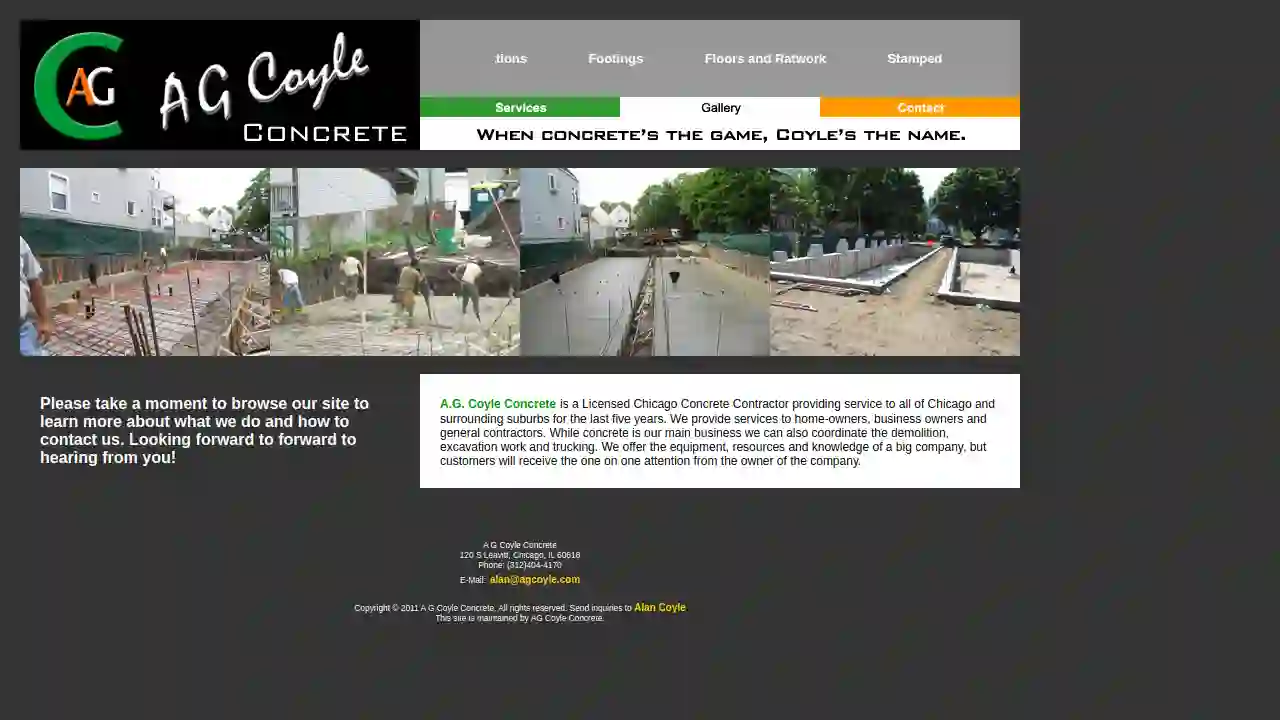
AG Coyle Concrete
1120 S Leavitt, Chicago, 60618, USA.G. Coyle Concrete: Your Trusted Chicago Concrete Contractor A.G. Coyle Concrete is a licensed and experienced Chicago concrete contractor serving the city and its surrounding suburbs for the past five years. We are dedicated to providing top-notch concrete services to homeowners, business owners, and general contractors alike. While concrete is our core expertise, we also offer a comprehensive range of services, including demolition, excavation, and trucking. We bring the resources and knowledge of a larger company, but with the personalized attention you'd expect from a family-owned business.
- Services
- Why Us?
- Gallery
Get Quote- Ry
Ryan Excavating
51 reviewsChicago, USFacebook is a social networking service and website launched in February 2004, owned by Meta Platforms. It is the largest social network in the world, with over 2.91 billion monthly active users as of the first quarter of 2023. Users can create a personal profile, add other users as friends, and exchange messages, photos, and videos. Facebook is also used by businesses to connect with customers and promote their products and services. The site has been criticized for its role in the spread of misinformation, its impact on mental health, and its privacy practices.
- Services
- Why Us?
- Gallery
Get Quote 
Osland Excavating Sewer Water Septic Services
51 reviewsChicago, US- Services
- Why Us?
Get Quote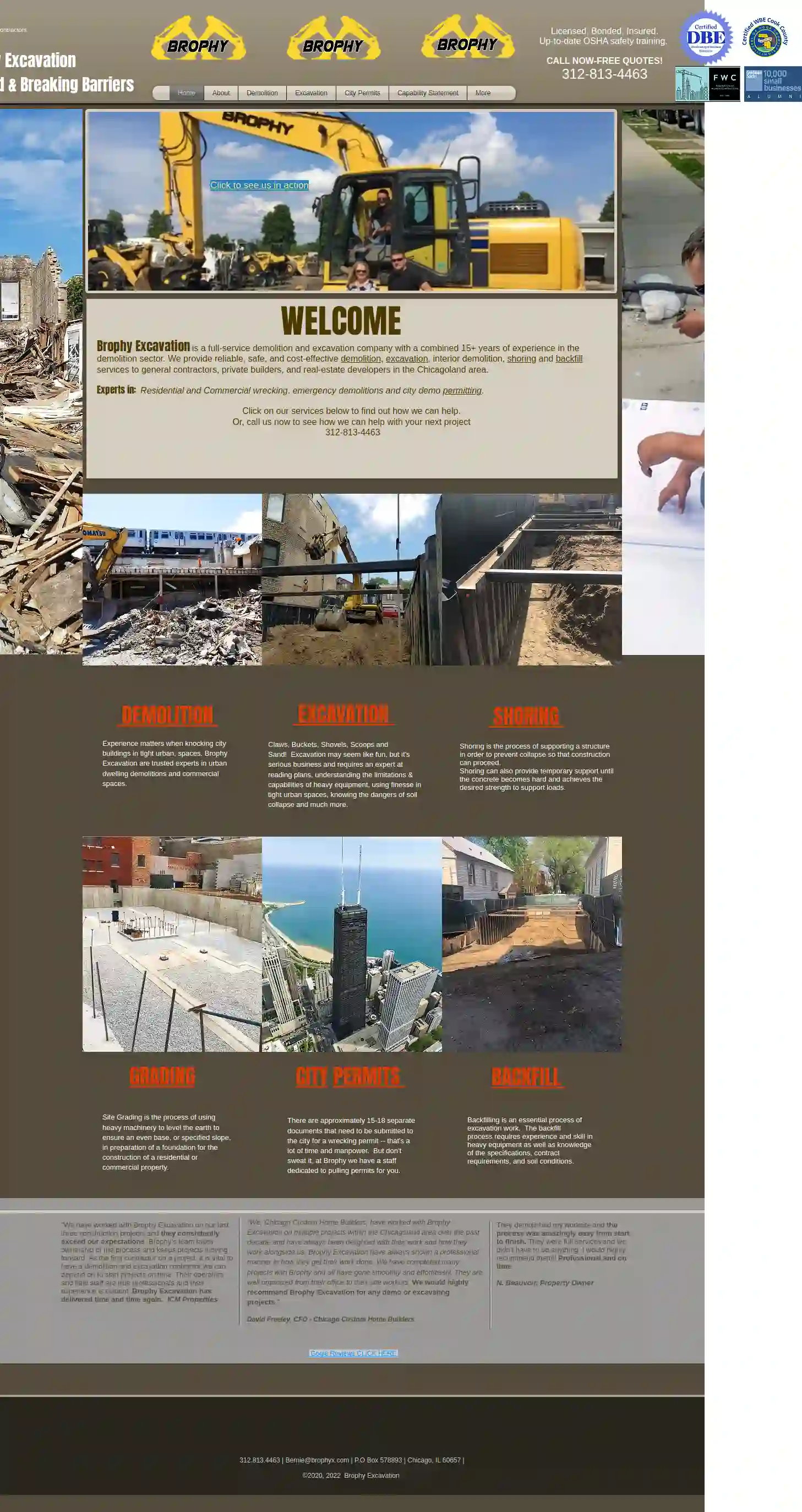
Brophy Excavation-Demolition
4.86 reviewsP.O Box 578893, Chicago, 60657, USBrophy Excavation: Your Trusted Partner for Demolition and Excavation in Chicago Brophy Excavation is a full-service demolition and excavation company with over 15 years of experience in the Chicagoland area. We provide reliable, safe, and cost-effective services to general contractors, private builders, and real estate developers. Our team of experts is dedicated to delivering exceptional results on every project, no matter how big or small. We specialize in: Residential and Commercial Wrecking Emergency Demolitions City Demo Permitting Excavation Shoring Grading Backfill At Brophy Excavation, we understand the importance of safety and efficiency. We are fully licensed, bonded, and insured, and our team is up-to-date on all OSHA safety training. We are committed to providing our clients with the highest level of service and professionalism. Contact us today for a free quote and let us help you with your next project.
- Services
- Why Us?
- Testimonials
- Gallery
Get Quote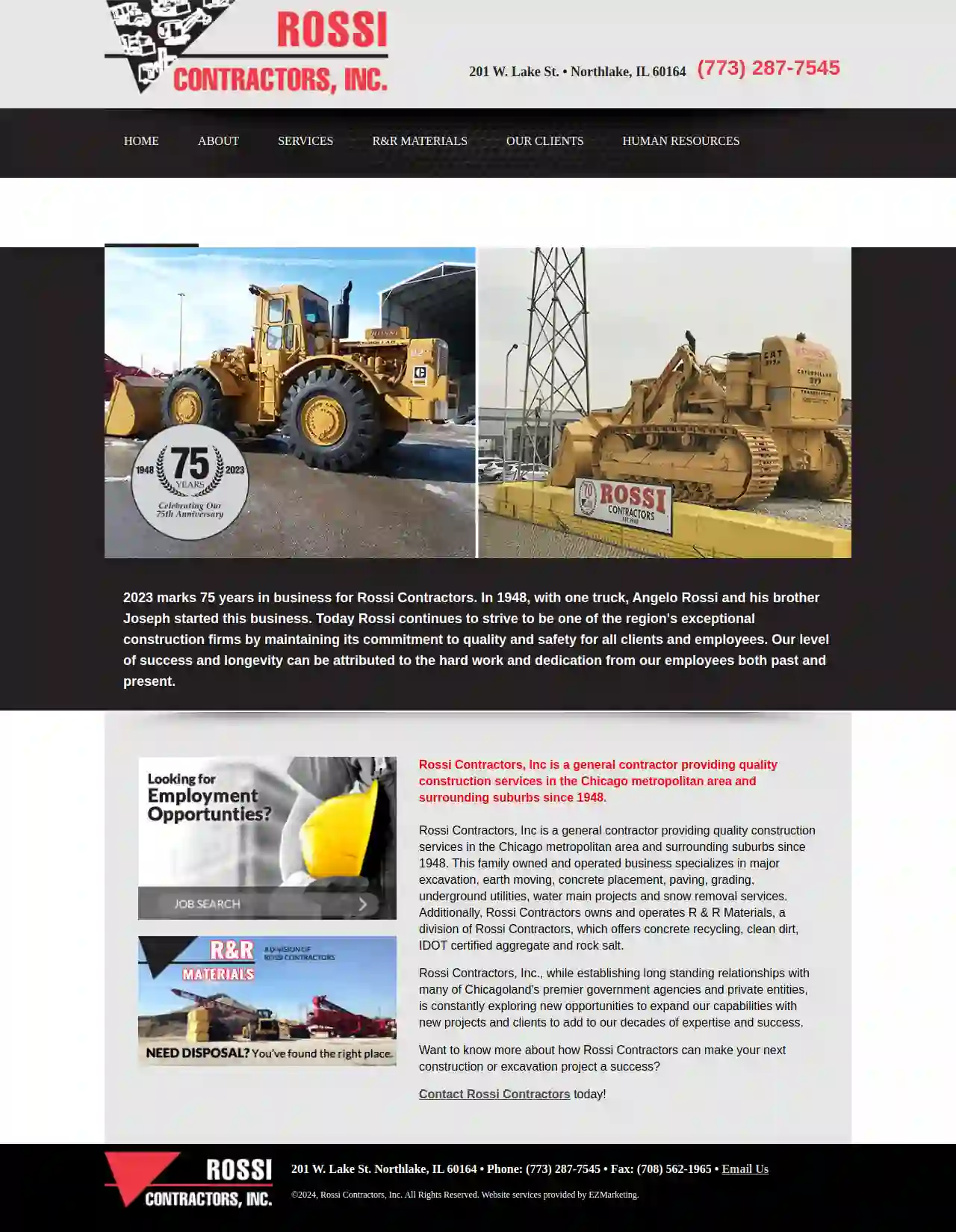
Rossi Contractors
4.630 reviewsChicago, US- Services
- Why Us?
Get Quote
Accelerated Excavation
511 reviews1202 S Court St, Marion, IL, 62959, USWho we are Accelerated Excavation is a premier excavation service provider specializing in municipality, commercial, and residential projects. With a team of highly skilled professionals and state-of-the-art equipment, we deliver top-quality excavation solutions tailored to meet the unique needs of each project. Who we work with Real estate developers General contractors Homeowners & Business Owners Engineers Utility Companies Municipalities Government Agencies Our mission Provide reliable, efficient, and safe excavation services, ensuring every project is completed on time and to the highest standards. We are committed to excellence, customer satisfaction, and environmentally responsible practices, making us the trusted partner for all your excavation needs. Why Customers Choose Accelerated Excavation Safety First: Strict adherence to safety protocols on every job site Trained Team: Skilled & trained contractors with years of industry experience On Time, Everytime: Projects completed on schedule, every time Advanced Equipment: State-of-the-art machinery for precise and efficient excavation
- Services
- Why Us?
- Testimonials
- Gallery
Get Quote
Lee Werner Excavating
56 reviewsChicago, US- Services
- Why Us?
Get Quote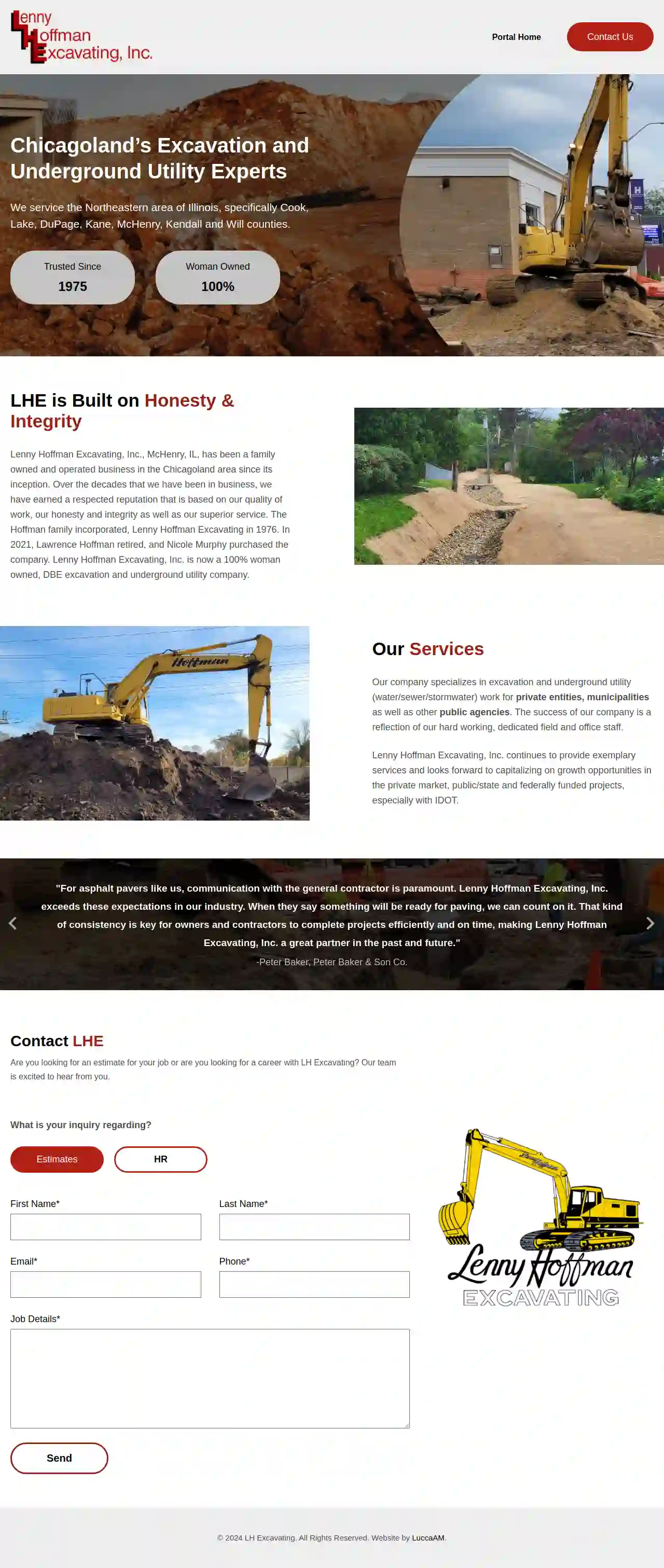
Lenny Hoffman Excavating Inc
4.17 reviewsMcHenry, USChicagoland’s Excavation and Underground Utility Experts We service the Northeastern area of Illinois, specifically Cook, Lake, DuPage, Kane, McHenry, Kendall and Will counties. Trusted Since 1975 Woman Owned 100% LHE is Built on Honesty & Integrity Lenny Hoffman Excavating, Inc., McHenry, IL, has been a family owned and operated business in the Chicagoland area since its inception. Over the decades that we have been in business, we have earned a respected reputation that is based on our quality of work, our honesty and integrity as well as our superior service. The Hoffman family incorporated, Lenny Hoffman Excavating in 1976. In 2021, Lawrence Hoffman retired, and Nicole Murphy purchased the company. Lenny Hoffman Excavating, Inc. is now a 100% woman owned, DBE excavation and underground utility company. Our Services Our company specializes in excavation and underground utility (water/sewer/stormwater) work for private entities, municipalities as well as other public agencies. The success of our company is a reflection of our hard working, dedicated field and office staff. Lenny Hoffman Excavating, Inc. continues to provide exemplary services and looks forward to capitalizing on growth opportunities in the private market, public/state and federally funded projects, especially with IDOT. Testimonials "For asphalt pavers like us, communication with the general contractor is paramount. Lenny Hoffman Excavating, Inc. exceeds these expectations in our industry. When they say something will be ready for paving, we can count on it. That kind of consistency is key for owners and contractors to complete projects efficiently and on time, making Lenny Hoffman Excavating, Inc. a great partner in the past and future." -Peter Baker, Peter Baker & Son Co. "Alliance Contractors, Inc and Lenny Hoffman Excavating have been working together for more than 30 years. Whether ACI is working for Lenny Hoffman as a subcontractor or they are a subcontractor to ACI, we have been nothing but pleased with their team’s ability to outperform the industry standards on each and every project." -Bradley A. Spiniolas, Alliance Contractors, Inc.
- Services
- Why Us?
- Testimonials
- Gallery
Get Quote
Witech Excavating
3.29 reviewsChicago, USA History of Strong Relationships Since our humble beginnings in 2001 as a small excavating and trucking company, we’ve continued to grow by building strong relationships. We’re always looking for new ways to provide better services to our clients and community. With our experienced personnel and extensive fleet of equipment, we have the resources to pass along the benefits to our customers. With competitive costs and knowledgeable employees, Witech provides superior responsiveness on all our projects. Although, the benefits don’t stop there. This level of control allows us to live up to our core values of integrity and honesty. Ultimately, when we say we’re going to do something, our clients know we mean it. Watch our Overview Video
- Services
- Why Us?
- Gallery
Get Quote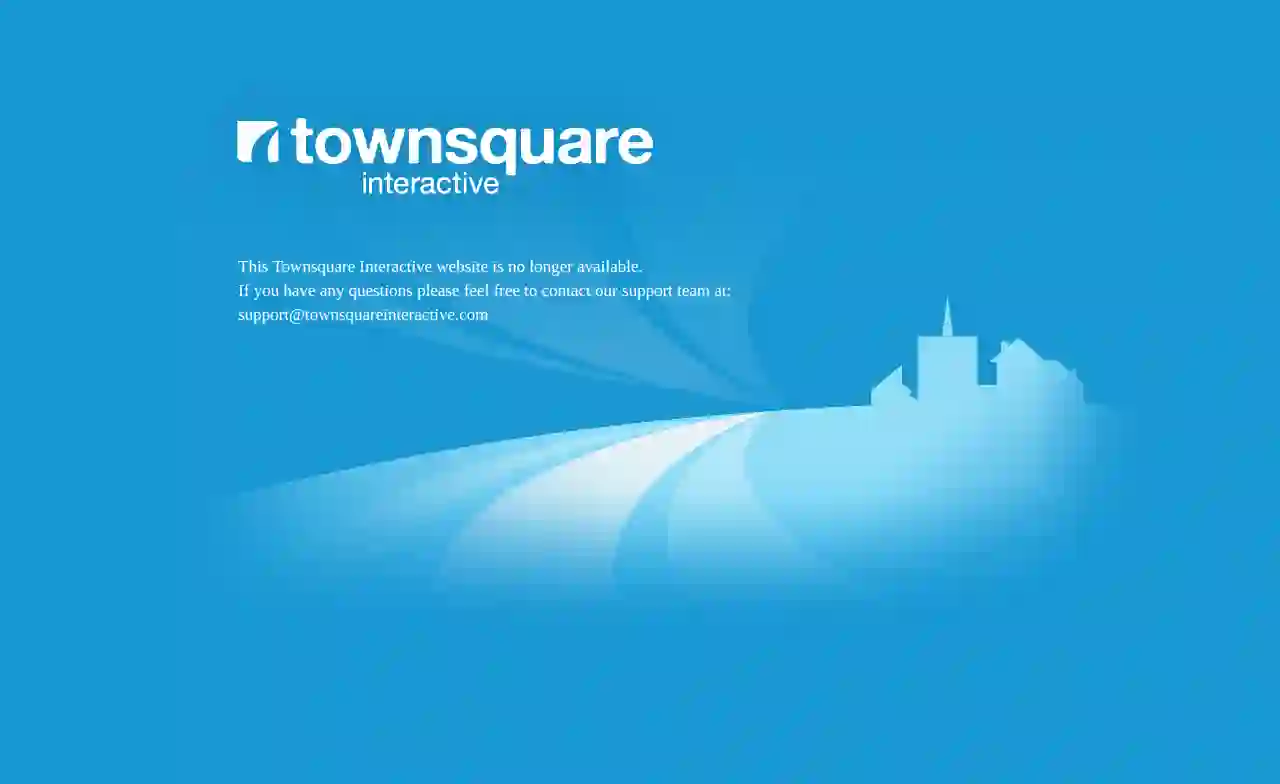
Illinois Excavation Septic Concrete
1Chicago, USThis Townsquare Interactive website is no longer available. If you have any questions please feel free to contact our support team at: [email protected]
- Services
- Why Us?
- Gallery
Get Quote
Over 3,943+ Excavation Contractors on our directory
Our excavation contractors operate in Chicago & surrounding areas!
ExcavationHQ has curated and vetted the Best Excavation Contractors in Chicago. Find the most reliable pro today.
Frequently Asked Questions About Excavation Contractors
- Clear the Area: Remove any obstacles, including vehicles, outdoor furniture, landscaping features, or structures, from the excavation zone and surrounding area.
- Mark Existing Features: Identify and mark underground utilities, septic tanks, sprinkler systems, or other buried elements you want to protect.
- Protect Landscaping: Use tarps or fencing to shield trees, shrubs, gardens, or other landscaping elements from damage.
- Provide Access: Ensure the excavation contractor has clear access to the work area, including gates wide enough for equipment.
- Discuss Logistics: Coordinate with the contractor regarding parking arrangements, material delivery, and any special instructions or concerns you might have.
- Trench Collapses: Unstable trench walls can cave in, posing a severe risk to workers. Proper shoring and sloping are crucial safety measures.
- Utility Damage: Striking underground utilities (gas, water, electric) can cause leaks, explosions, or electrocution. Accurate utility locates and careful digging are essential.
- Falling Objects: Materials or equipment falling into excavations can injure workers. Securing work areas and using appropriate safety gear is vital.
- Equipment Accidents: Operating heavy machinery involves risks of rollovers, collisions, or mechanical failures. Trained operators and proper equipment maintenance are critical.
- Environmental Hazards: Excavated soil might contain hazardous materials (asbestos, lead). Proper testing and disposal procedures are necessary.
What is the difference between cut and fill excavation?
Cut: Involves excavating soil from an area where the existing grade is higher than the desired grade.
Fill: Refers to using the excavated soil ('cut' material) to raise the grade in an area where the existing grade is lower than desired.
This method minimizes the need to import or export soil, reducing costs and environmental impact. It's commonly used for site preparation, road construction, and landscaping.
What is the difference between excavation and grading?
Excavation: Primarily involves removing earth or other materials from a site. It's about digging down and creating space.
Grading: Focuses on shaping and leveling the ground to a specific slope or elevation. It's about adjusting the existing terrain.
For example, you might excavate a foundation and then grade the surrounding area to ensure proper drainage and a level surface for landscaping.
How do I prepare my property for excavation?
What are the risks associated with excavation?
What is the difference between cut and fill excavation?
Cut: Involves excavating soil from an area where the existing grade is higher than the desired grade.
Fill: Refers to using the excavated soil ('cut' material) to raise the grade in an area where the existing grade is lower than desired.
This method minimizes the need to import or export soil, reducing costs and environmental impact. It's commonly used for site preparation, road construction, and landscaping.
What is the difference between excavation and grading?
Excavation: Primarily involves removing earth or other materials from a site. It's about digging down and creating space.
Grading: Focuses on shaping and leveling the ground to a specific slope or elevation. It's about adjusting the existing terrain.
For example, you might excavate a foundation and then grade the surrounding area to ensure proper drainage and a level surface for landscaping.
How do I prepare my property for excavation?
- Clear the Area: Remove any obstacles, including vehicles, outdoor furniture, landscaping features, or structures, from the excavation zone and surrounding area.
- Mark Existing Features: Identify and mark underground utilities, septic tanks, sprinkler systems, or other buried elements you want to protect.
- Protect Landscaping: Use tarps or fencing to shield trees, shrubs, gardens, or other landscaping elements from damage.
- Provide Access: Ensure the excavation contractor has clear access to the work area, including gates wide enough for equipment.
- Discuss Logistics: Coordinate with the contractor regarding parking arrangements, material delivery, and any special instructions or concerns you might have.
What are the risks associated with excavation?
- Trench Collapses: Unstable trench walls can cave in, posing a severe risk to workers. Proper shoring and sloping are crucial safety measures.
- Utility Damage: Striking underground utilities (gas, water, electric) can cause leaks, explosions, or electrocution. Accurate utility locates and careful digging are essential.
- Falling Objects: Materials or equipment falling into excavations can injure workers. Securing work areas and using appropriate safety gear is vital.
- Equipment Accidents: Operating heavy machinery involves risks of rollovers, collisions, or mechanical failures. Trained operators and proper equipment maintenance are critical.
- Environmental Hazards: Excavated soil might contain hazardous materials (asbestos, lead). Proper testing and disposal procedures are necessary.